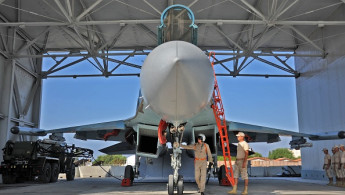Did Israel target Russia's Hmeimim airbase in Syria missile strikes?
Israel has broadened its attacks in Syria with reports this week it struck Russia's Hmeimim base in Latakia in a series of missile strikes.
The New Arab's Arabic-langage sister site, Al-Araby Al-Jadeed, confirmed on Friday that a weapons depot belonging to Hezbollah, lying close to Hmeimim, was the target of the attack, amid an escalation of Israeli strikes on the group in Lebanon and Syria.
The missiles hit areas of Syria under Moscow's influence early on Thursday morning, with suspicions that Russian military facilities might have been targeted, including the Hmeimim airbase is situated southeast of Latakia city, in Syria's north-western coastal region.
This facility was expanded in 2021, after coming under Russian control in 2015 when Moscow entered the war to protect the Syrian regime, following earlier interventions by Iran and Hezbollah.
Hitting this airbase would likely lead to the biggest crisis between Moscow and Tel Aviv since the downing of a Russian military plane in 2018 during Israeli airstrikes.
Syrian opposition sources, however, denied that Hmiemim was targeted and said an Israeli warship in the Mediterranean Sea launched several long-range missiles at an arms depot belonging to the Iranian Revolutionary Guards (IRGC) and Hezbollah.
Syrian civil defence were sent to extinguish fires around the depot but sources said they did not observe any Russian personnel battling the blaze, as some pro-regime media had claimed.
This is the closest point Israel has struck to Hmeimim airbase, and although no damage was inflicted to the facility it could still threaten a Russian-Israeli understanding - in place since October 2021 to prevent friendly fire incidents in Syria - as Tehran would be unlikely to store weapons so close to the Russian military facilities without a greenlight from Moscow.
There has so far been no official response from Moscow regarding the Israeli strike.
Israel's almost daily attacks on Iranian and Hezbollah targets have also seen intense strikes of Damascus in recent days, where on Tuesday an early-warning radar system was targeted.
Israel has targeted Iranian facilities in Latakia and Tartous before, including in March, when a prominent Iranian naval officer Reza Zarei was killed in strikes.
Syrian political researcher Ahmad Korabi told Al-Araby Al-Jadeed that the strike was "unprecedented" and could be read in multiple ways - on one hand signalling that the Russian-Israeli understanding on the military situation in Syria has ended or that Israel had a greenlight from Moscow to carry out the attacks.
Korabi said Russia-Israel relations also suffered since the Ukraine war erupted in 2022 with Moscow accusing Israel of supplying Ukraine with weapons.
Alternatively, Israel is also likely wary of Russia's strengthening military relations with Iran, including the widespread use of Shahed drones in the Ukrainian war.
"Moscow may be trying to balance its relations with the Iranians and Israelis - letting Tehran store weapons near Hmeimim, while simultaneously not reacting to targeting by Tel Aviv," he said.
Syrian military analyst Colonel Abdul Jabbar Akidi said Israel's strike "came in the context of its constant targeting of Iran's arms in the region, especially the Lebanese Hezbollah".
He said tensions had slid into what was an "all-out war against Hezbollah", which is being pursued across Syria from Deir az-Zour in the east to the coast of the country.
"It isn't clear whether Tehran has abandoned its militias and arms in the region, in exchange for protecting its nuclear plan and keeping itself safe from attacks," he said.
"It seems that the phase of cooperation between Iran, the West, and Israel has ended, and a new phase has begun based on removing Iranian militias from Israel's borders.
"There will be new agreements and understandings in the region that are completely different from the previous ones."
This article is based on an article which appeared in our Arabic edition by Mohammed Amin on October 4 2024. To read the original article click here.




 Follow the Middle East's top stories in English at The New Arab on Google News
Follow the Middle East's top stories in English at The New Arab on Google News
![A group of Palestinians, foreign and Israeli activists gather to participated in an olive picking event on the land in the town of Battir, which is under threat of confiscation by Israel in Bethlehem, occupied West Bank on 8 November 2024. [Getty]](/sites/default/files/styles/image_330x185/public/2182930803.jpeg?h=199d8c1f&itok=__0LgGsa)

![People gathered around the rubble of destroyed houses to search for survivors [Getty]](/sites/default/files/styles/image_330x185/public/2024-11/GettyImages-2184733820.jpg?h=199d8c1f&itok=NiM1LO2f)